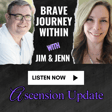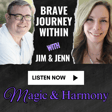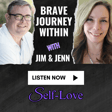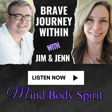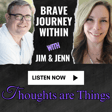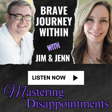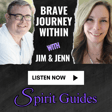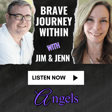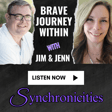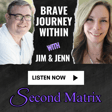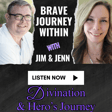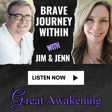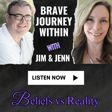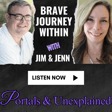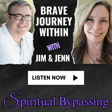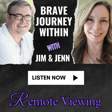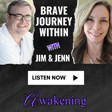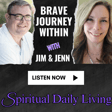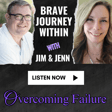Introduction to Empowerment and Boundaries
00:00:01
Speaker
Welcome to the Brave Journey Within with Jim and Jen. This show is about the spiritual journey and all of the challenges, healing, wisdom and consciousness expansion experienced along the way. Welcome to a new edition of the Brave Journey Within.
Victimhood and Boundaries from Fear
00:00:18
Speaker
I'm Jim and this is Jen and today's episode is going to be on empowerment and boundaries and the combination of
00:00:30
Speaker
how they play together in that dynamic. And Chin, I'll give it to you to sort of articulate our aim for today, if you wanted to let it go. Yeah, so this is one of those conversations that I think can be really eye opening to people because
00:00:49
Speaker
We all get bothered. We all get triggered. We all have things that happen where we feel like someone is doing something wrong towards us or around us in some way. And this kind of comes into the whole idea of victim and things like that. And the idea that when you feel like a victim to someone else's behaviors, no matter how bad or how small it is, there's no power in that space, right?
Shifting Focus to Positive Growth
00:01:14
Speaker
But what I find a lot of times happens is you know people do something they do us wrong Jim they do something and We maybe some of us take it for a while and we are a bit of a doormat and we see ourselves as a martyr or something in some way and then what ends up happening is we finally get so frustrated that we put up boundaries and so with that
00:01:43
Speaker
One of the things I've been learning over the last maybe year or so is that when you put up boundaries out of fear or anger, you're creating a resistance in the field. And whatever it is you resist persists. It's not free-flowing energy. Yeah, I think we should explain that in detail. Please.
Creating Healthy Boundaries from Love
00:02:10
Speaker
I think what we're talking about is when we have something we don't like or someone in our life that we don't like, we kind of want to push them away in someone. And that when you do that, like that resistance almost causes an attraction. Yes.
00:02:32
Speaker
And keeping that in mind and whatever you focus on will expand. So if you're focusing on what they did or what they did wrong or how they harmed you in some way, you're then focusing on that. So you're going to see more of that in your life experience. You're feeding it.
00:02:50
Speaker
Right. It's kind of like if you start saying, you know what? I think I want to buy a red car. You suddenly start seeing red cars all over the place. But otherwise, you're kind of oblivious to it, and it doesn't seem to affect you. It's the same kind of thing, only on a much different level. And so the idea that I think we're trying to come across with today is how do you step into your power, your true power? And first off, what is even your true power?
00:03:19
Speaker
and get out of that victimized feeling or that victimized state and have maybe an idea of what a healthy boundary looks like instead of creating out of resistance, creating out of love and a desire to shift and move into something that you really want instead of focusing on what you don't want.
Self-awareness in Relationships
00:03:40
Speaker
I think part of that too is we all have this natural desire to be around things that are pleasant and not unpleasant as if we can possibly avoid those things.
00:03:56
Speaker
Well, but that said, the more you focus on those negative things, the more of those negative things you're going to get. Sure. So I think what I'd like to talk about today is, well, first off, our experiences around that, if you're up for it and just how we've navigated some things to maybe, you know, get into a healthier state in a relationship or something, but also, you know, what, what does it actually look like to have healthy
00:04:25
Speaker
definitions or what you might want to call boundaries. Sometimes I hesitate to use that word because I think people think boundaries as the resistance side of things. So I tend not to use the term boundaries if I can help it, but it's more about defining what you want in a relationship. So if you've got somebody who's constantly pushing your buttons, well, clearly that's not really what you want. So instead of putting resistance upon that relationship,
00:04:54
Speaker
go within and ask, well, how is that trigger or that button pushing serving me?
Manifesting Desired Relationships
00:05:02
Speaker
It might be trying to help you get into your power. It might be showing you where maybe you're impatient or you've got some growth work to do, but it's always serving you in some way. So I would say the first step is really maybe looking at what is it trying to show you, healing that or growing from it.
00:05:19
Speaker
being so really being curious about, you know, asking yourself or doing your own introspection about why that's triggering to you. Exactly. Yeah. And then moving into a state where you're defining what you really want. So maybe if that person is not family or someone you have to be around or whatever, but maybe it's just a friend and they know how to trigger you. Well,
00:05:45
Speaker
If that's not the person who you really want in your circle, in your inner circle, instead of shoving them aside and putting up resistance and being in the drama of that, how do you then communicate to the universe what it is you really want in close friends? And what I have found is a lot of times what happens, maybe not always, but I think it's every single situation is unique, but they end
Energy Dynamics in Friendships
00:06:12
Speaker
up just kind of falling away.
00:06:14
Speaker
Sometimes quickly, sometimes it takes a little while, but usually that doesn't seem to have to be as much drama around it. Like it doesn't have to be this big deal. No, it kind of has a natural rhythm and a natural flow. I don't think that's true for every single thing. Like I think if someone's abusive, you know, clearly sometimes I think hardcore boundaries and no needs to happen so that you can get out of the situation to then recover.
00:06:44
Speaker
and learn from it. But, you know, so like every single situation is different. Yeah. You know, I've considered myself very blessed to have really good friends. And I didn't realize, or maybe didn't appreciate it as much. Just realizing that not everyone has that, you know, in their life.
00:07:09
Speaker
And of course, every now and again, people cropping up that I don't want to use the word.
00:07:18
Speaker
uh, energy vampires, but there's take, you know, we all give and take in a relationship and sometimes it's more one sided than not. And I think that's where a lot of people can get caught up in like, okay, why,
Identifying Unhealthy Dynamics
00:07:34
Speaker
why am I giving this person so much attention and so much energy? You know, like where, where is the line with that?
00:07:41
Speaker
you know, is this healthy or not? And what might I need to change with that to make it so it's not hindering me or hindering my growth? Or if there is a trigger, how can I utilize that for my growth? And then maybe the relationship fades after that. Yeah, yeah. Well, what do you think Jim is
00:08:07
Speaker
like the best steps to recognize maybe a place where things are unhealthy. Because that's really what we're talking about. What's healthy and what's not? Because I think a lot of us think toxic, codependent relationships is just how people are. So it's normal. I think a lot of people don't realize how unhealthy that can be. So would you go over what that looks like?
00:08:36
Speaker
Yeah, I think where I would start is how do I feel when I'm around that person? You know, what is my felt sense? You know, I'll talk about a body scan meditation in mindfulness, but it's being aware and tuning into your body because that's where emotions are felt. And how do they make you feel?
00:09:02
Speaker
You know, it's not easy for everyone, especially if you're like, you know, very analytical, like oftentimes in my life in history, if you said, Hey, Jim, how do you feel? I would say I'm good or I'm okay. Was that true? Sometimes maybe.
00:09:24
Speaker
You know, like I'm always good, but was I being honest and like, did I even know? And the answer is probably not. Like I didn't really know how I felt cause I was thinking and not feeling, you know, cause emotions were in some sense dangerous, but they are helpful as far as helping you tune into, you know, how you actually feel about something. So that's an ongoing process for me.
00:09:54
Speaker
You know, how do I feel about my interactions with this person? You know, like, that's Spidey sense.
Boundaries in Professional Contexts
00:10:00
Speaker
You know, is this healthy or not? Or is it just transactional and this person just wants something from me? You know, and it's not that they can't be really good people, but I've had that too, where it's like, okay, you want something from me. What do I get out of this? Like, it doesn't seem like I'm getting anything out of this.
00:10:21
Speaker
Yeah. Yeah. It's interesting. They're definitely when things seem out of balance or also when things are too needy, you're like the co-dependency when there's like a need there to have something happen with that person or to receive or give in a certain way. Like that just seems like it just sets the whole thing up for failure in the crossing of healthy boundaries and things like that.
00:10:52
Speaker
Well, people can become self-reliant. Well, sorry, reliant on someone else for validation. You know, do you think I should do this?
00:11:01
Speaker
I don't know, what do you think? Does it feel right for you or not? Because I've definitely made decisions in my life where it was based off other people. And I'm like, wait, why did I do that? It's like, oh, this other people had a favorable opinion on this job or the school. And so I did it, but didn't really do my own due diligence and my own self introspection on it. So you can get into trouble. Yeah.
00:11:31
Speaker
Well, you know, it's funny, something that's just kind of coming to me. When we're in relationships and we don't feel empowered, we either blow up or get passive aggressive because we're not feeling like our needs are met or our desires for a healthy relationship are not met, or we do the block and we just leave.
00:11:59
Speaker
and we put up all the resistance. So I'm curious, I would think that the first thing that someone needs to do if they're really trying to become empowered is just have enough love for yourself to respect your own needs. And then how do you move forward in a way that's not in resistance to what has shown up and
Standing in Personal Power
00:12:23
Speaker
create the life and the relationships that you desire
00:12:28
Speaker
without putting up blockades. So how would you recommend someone steps into that space? Well, sometimes I think you do have to say no. There's authenticity. Then there's morality, your integrity, what is truly authentic for you.
00:13:00
Speaker
I would say still have a friend, but they've kind of faded away. But there were issues with addiction and domestic violence. And that was really hard to tell someone, listen, I can't be around this right now. I want you to get healthy and I want you to be well.
00:13:25
Speaker
I'm not trying to necessarily push you away, but I just can't be apart. I can't be in this fear. It's too negative. And wishing them well and also receiving them back knowing that there's a path of redemption. The door's not shut, per se. And that ended up happening. That was actually nice. But does that answer your question?
00:13:54
Speaker
Yeah, I think so. Because I have my own idea of what this is, but it's more of my own experience. And how do you love yourself enough to know what your needs truly are and then to make those choices in a way that just it's coming from a positive space and a loving space rather than a reactive blocking resistance space?
00:14:22
Speaker
Well, in the situation I was sort of referencing, I had to love myself and to risk losing the relationship to sort of stand in my own power and what I thought was the right thing to do. So I had to be willing to risk that, but it came from a loving place versus fear, you know, of
00:14:49
Speaker
I don't know, but whatever the fearful, it was deliberate, right? Like there was an intention behind it. In kind of our first episode, fear versus love, you know, like what that is, sometimes that requires you to have difficult conversations with people.
Workplace Boundaries Metaphors
00:15:11
Speaker
And it's, you can do that from a loving space, which I think is empowering. Or you could do that from a fear-based reaction, like,
00:15:20
Speaker
I'm just going to write this person off. They cross the line, which also gets into judgment. They've made a mistake or whatever, and I'm not going to deal with them anymore. The opposite of that is being non-judgmental, but again, tuning into yourself. What is it that you want? How do you want to show up in your life?
00:15:49
Speaker
How do you want to be? Who is helping you on your path? And maybe who is blocking you in some way, which I think are all sort of lessons. So I think what you're asking is how do I flow with that in a way that's okay. That's an alignment with you, right? Yeah, it's funny. And it's not just you.
00:16:18
Speaker
What's that? A great word, by the way, alignment. Like asking yourself that question, like, what are my values? Yeah. And what are my desires? But this is also true, I think, in situations. So like when people have jobs they don't like or, you know, and they feel it's just not in alignment with who they are and they feel very disempowered. How do they step through that? What would you recommend there? Maybe it's not a person, but it's a situation.
00:16:53
Speaker
Just had a conversation with a highly intelligent and wonderful woman about the people that you work with. I don't know if you're familiar with the frog and the scorpion. I think I have heard of that. Have you heard of that? I think so, but go ahead and describe it.
00:17:15
Speaker
There's a river, there's a frog, he's about to cross the river and the scorpion says, you know, hey, can I get a ride? I want to get to the other side of the river. And the frog is like, nah, like you'll sting me a little sink, right? Like I don't want to do that. He's like, well, why would I ever do that? Like if I sting you, like I'll die too. And the frog thinks about it as like, okay.
00:17:41
Speaker
Uh, let's do it. And so they're going and they get like halfway across the river and the scorpion can't resist and stings the frog. And, you know, of course he said, why did you do that? And the scorpion was like, cause I'm a scorpion.
00:17:58
Speaker
Right. So this was in terms of like work, like sometimes you might be with someone who's always trying to like stab you in the back or there's always an angle. You might not be in alignment with your boss or your work situation, you know, and what do you do then? Like what is a healthy boundary?
00:18:25
Speaker
These are not easy questions, by the way.
Understanding the Cartman Triangle
00:18:28
Speaker
No, they aren't. But they're questions that you will benefit by asking yourself and figuring that out. You know, like, I think I've been in situations too where the maybe, and I've definitely come across this a number of times where situation is not great, but you have someone who is strong and healthy and looks after people in that work environment.
00:18:56
Speaker
And so they serve a role. It's interesting to see how that plays out because ultimately they want the people below them to be empowered and kind of take control of their own path.
00:19:17
Speaker
And so they're not dependent on them, but sometimes you might find yourself in that situation. And if you have awareness of it and you're doing it willingly, so not at your detriment. And that's actually a formula that I used, that I came across a few years ago. I'm willing to help, but not at my detriment.
00:19:40
Speaker
So as one sort of litmus test for what is healthy versus not doesn't mean that you can't sacrifice or do things, but to do it with awareness. So you're not, I don't know, like a martyr or falling into that, you know, yeah, that's awesome. I love that. That's, that's a great formula. Well, I I've done the opposite.
00:20:09
Speaker
Me too. Wait, I don't have to do that. You know, why am I choosing to suffer and really do that? And it's like, that's not helpful to me. Well, I think that comes back to the self-love, right? I think a lot of times people keep putting themselves in those situations because they're wanting to receive love and approval from others.
00:20:35
Speaker
And if we come back to, we love ourselves enough to choose what is best. And if we need to sacrifice our time or to donate our time or to put in more effort than maybe the average person would or whatever, doing that out of choice because it's what we're choosing, it's what we're defining that we would like to do right now, but not out of need for the approval and all of that, it really seems like that's the winning combination.
00:21:06
Speaker
So a couple things come to mind with that. When I talked about Tony de Mello's book, Awareness, where he talks about approval being a hell of a drug. One of the lines I'll use in some of my self hypnosis that I've come across is the only approval that you need is that of your own. And so that's very empowering.
Self-love and Empowerment
00:21:34
Speaker
That takes some work to get to, but if you can get there, then ultimately you're not. You free yourself from worrying what other people think is right or wrong, because everyone's going to have their own perspective one way or the other. That is so true. That's very empowering right there. Now, the only other thing I would say with that
00:21:57
Speaker
to advocate for the idea of growth is also the realization that none of us are perfect. And so while our approval is what matters for ourselves, to also be aware, and I still have growth to do, right? So that it's not just like, I'm gonna do whatever I want. You know what I mean? Because it does affect other people. So while not caring,
00:22:23
Speaker
about how other people are necessarily thinking of you to still be in integrity and to still be working at yourself and your own morality and your abilities to be able to serve to the highest capacity of your being. Sure. Yeah. Well, there's consequences to everything. Yeah, karma, right? That little thing. Right, right. Well,
00:22:51
Speaker
So I'm curious, let's assume that maybe somebody listening today has some sort of a situation where, let's say it's a relationship and you got somebody who are, you're trying to put up boundaries, you're feeling a little bit like a doormat or you feel like it's an imbalanced relationship in some way. And maybe it's codependent or something like that. And maybe someone's working to get out of that.
00:23:21
Speaker
What are some steps that you would maybe recommend? To get out of a codependent relationship? Or if it's not codependent, at the very least, maybe a relationship that just feels it's toxic or it's just not quite what you want without putting up those resistance boundaries. Well,
00:23:50
Speaker
One thing that mindfulness, when you go through sort of some intense mindfulness courses is those difficult things are always there, but you get to choose how you work with them. So if there is a difficult person, just being aware of your interaction with that, like how can I flow with that? You know, there is someone I love dearly.
00:24:19
Speaker
can't take being around them for too long because it's just too much. But I'll ask myself that question, like how much am I willing to give? And sometimes it's quite
Intentional Time and Relationships
00:24:32
Speaker
a lot. And I'm willing to do that because I love them. But I'm aware that at some point I'm going to have to say, Hey, I got to go. Like enough is enough.
00:24:46
Speaker
You know, I have some really good friends. I might get five minutes on the phone with them and I know it's five minutes. That's just the way it is.
00:24:59
Speaker
And it's not bad, but the intention behind it is like, let's make it five good minutes. You know, we don't get to see each other that much in our time on the phone, it's limited. Let's make it good, make it count. And so being intentional about how you're spending your time, you know, where you're focusing and putting your effort in relationships, you know, where you're not overextending yourself or burning yourself out.
00:25:26
Speaker
in a number of things. If someone's taking up your time, you do have to be protective of that. I think that's a boundary. You know, I'm willing to give you this much time before I need to focus on other stuff. It's just the way it is. It's not personal and being okay with that. Does that give you? Yeah. Why would you know it gets sticky?
00:25:55
Speaker
Right. Sure. What are the sticky parts that come up? Well, you know, I think anytime I've tried to navigate that in relationships with people, especially clients, you know, I have some clients where if they
00:26:12
Speaker
start becoming, um, maybe friends is the wrong word, but if they start kind of moving in the direction of it's friendly as opposed to, uh, you know, like a practitioner client relationship, um, there's definitely all of a sudden there's bound. There's like, there's weird boundaries and gray areas that start getting crossed and they start texting a lot or whatever. Right. And, but where it becomes sticky is
00:26:43
Speaker
they probably don't see that they're doing anything to cross boundaries.
00:26:46
Speaker
they just think they're moving into a deeper relationship or something because that's what they do. And for me personally, I'm not a texter. I've got so much going on. I don't have time to be catching up with people over texts and things like that. So I'm one of those people who are like, you might get five minutes, a couple of times a year. Because it's just hard to fit it all in and with a lot of people reaching and trying to get your attention. And- I'm smiling because I'm the exact opposite.
00:27:15
Speaker
I want to get a hold of me and you don't text me, you might be waiting. Yeah, well, that's just the way it is with me. And you know, sometimes I look at my phone and I've got 15 people that have just texted me and I'm like, it's overwhelming. And I don't have time for that. And so yeah, it's just it's fun, kind of navigating this because
00:27:38
Speaker
So I think what that speaks to though, is clarifying. Boundaries like, uh, you can, I don't know, whatever you decide, right? Like therapists go through this too, but it's. Mm-hmm.
00:27:53
Speaker
You can text me, I'm probably not going to respond at a certain time, right? Or on the weekend or like a phone call and therapists have different, you know, boundaries with that or rules and things like that.
Strategies for Toxic Dynamics
00:28:08
Speaker
But those are things that come up, you know, where it's like clarifying, you know, what's okay, what's maybe not okay. And then being able to say that, you know, so that you're kind of just clear with it.
00:28:21
Speaker
Yeah. That's not always easy, right? Yeah, it's not. Yeah. But I think it's helpful to bring up the sticky situations, you know, that come up with people. Anything else come up to mind? There's lots of them, right? I mean, there's always expectations. There's this idea of, I don't know, I need help.
00:28:50
Speaker
or someone needs help, but it ends up starting to become, have you ever heard of the Cartman Triangle? The Victim Triangle? Cartman Triangle. Cartman Triangle, Victim Triangle. So you've got, it's basically, it's just a toxic relationship, but it's, you know, you have the victim, you have the persecutor, and then you have the rescuer.
00:29:12
Speaker
And usually they take turns playing different roles. But typically you have someone who likes to be the rescuer, and then you have other people who like to be the victim. And so you play this triangle out. And then at some point, each person typically becomes a persecutor.
00:29:29
Speaker
But then when, let's say, the victim becomes the persecutor, then the rescuer becomes the victim because they feel victimized by the persecutor now pointing fingers at them and saying they did something wrong or they aren't doing their job well enough or something. So it's like around and around you go, right? And I tend to play the rescuer role a lot. That's been something I've done throughout my life where I tend to rescue people.
00:29:56
Speaker
even as a practitioner, right? So I've had to get really clear on what does it mean to be a practitioner and to help facilitate someone's healing and moving forward and empowerment in their lives. And so empowerment really becomes a big word for me because I want them to feel empowered. I don't want them to feel like they need me because the minute they feel like they need me, I'm being put into that rescuer position again.
00:30:20
Speaker
And so it's very interesting, you know, the dynamic of all of that. And as soon as the race, usually the rescuer who tries to leave the situation because they're the one who typically feels more empowered. So when they leave the situation or try to get out of that triangle or approach things in a different way, the person who likes to play the victim in that triangle gets
Empowering Others and Responsibility
00:30:47
Speaker
And it becomes very dramatic. And I've experienced this multiple times in my relationships with people and trying not to be the role of the rescuer or the role of the victim. I certainly don't want to be in that role either. So leaving that dynamic, trying to lead the relationship or the dynamic into something more healthy. And there's usually a lot of resistance with that.
00:31:15
Speaker
Would you say, I mean, ultimately you're trying to empower the victim to not be a victim anymore. Right. And to not keep me in that toxic role because that's not what I want. So like over the years, I've tried different things. I've tried the blocking and the resistance.
00:31:37
Speaker
I've, you know, tried the overpowering, you know, trying to like, stop, you know, this doesn't work. None of that works. But just redefining what I feel like my role is in that person's life really helps. Yeah. So I'm not gonna play the role. So bringing awareness to your, once you recognize it, because sometimes you may not
00:32:08
Speaker
Or maybe that's part of kind of being in that situation, like, okay, I can help show you the path. And these are some things that you're going to want to do. But I'm not responsible for the outcome of that.
00:32:26
Speaker
And that took a long time for me to be comfortable with or more comfortable with. I don't know if you're ever completely just good with it, but like, we're all walking our own path and you're responsible for it.
00:32:42
Speaker
what you do, not what anyone else does. You can lead a horse to water, but you can't make him drink. You can point out these are some things that you can do to empower yourself, but you don't have to do them if you don't want to. We were talking about forgiveness, and I think that's maybe something to bring up, but it's
00:33:10
Speaker
you know, are you willing to forgive this person if it means that you can move forward and not, you know, shift out of maybe this victim mentality. And they were like, No, I got, I got some room for hate in my heart. I was like, okay, but like, you're fully aware of it. So okay, you know, like, that's, okay, you're doing this out of your own free will.
00:33:39
Speaker
But understanding where, you know, kind of what we were talking about earlier, some people, they're acting from their own trauma and their own past experience, right? So I was telling you that I tell my clients, like, don't let miserable people make you miserable.
00:33:58
Speaker
But to understand, and you don't necessarily have to forgive them, but in the mind of the master, understanding can replace forgiveness. They're coming from somewhere. They're acting out their wounds on you. Or whether it's anger or some other emotion, they're projecting their own stuff onto you.
Mindfulness in Difficult Choices
00:34:19
Speaker
And you see that so often. Just if you know that, then you
00:34:26
Speaker
Give yourself a better shot at not becoming susceptible to that trap, almost. Yeah, it really is a trap. And that's a good word for it. Well, you followed the whole enough times, Jen. I think most of us could say we've fallen in that hole a few times.
00:34:53
Speaker
Yeah. So what are some sticky situations that we could cover that we haven't already? People, if you don't conquer these things, they tend to repeat, right? So they become themes in your life. So they'll keep happening. Sometimes I'll see people that are in toxic relationships and they leave.
00:35:21
Speaker
You know, our guys and maybe I'll speak more for guys, but it happens with females too. You don't do any kind of work on yourself and then you end up in the same thing. Yep. Because you haven't figured it out yet. Yeah. Even if, and it's not that people don't tell you sometimes they're clarity telling you like, Hey, you shouldn't do that. You do it anyway. Yep. Yeah.
00:35:51
Speaker
So Jim, I think one of the ways that we can help people learn how to get more empowered because, well, really honestly, it's a journey of empowerment. I think the universe likes to give us opportunities to get more and more into our divine power. And, but one of the ways to do that, I think to start with is to just recognize where you're not loving yourself enough and move into what you need to do to really honor and respect and love yourself.
00:36:21
Speaker
in any relationship. Yeah. And so yeah, how, how would you recommend, you know, obviously getting in touch with yourself, doing the meditation, defining what it is you really do want, because I think most people don't even know what that is. And they're so busy trying to get approval from everybody. They don't know what really is serving them. There's one tool that I use that can be helpful.
00:36:50
Speaker
And that is the wheel of life where it's, oh, that's cool. But if you pay attention to different components of your life, right? And while it's just a pie chart that is symmetrical, when you start to assess what
00:37:13
Speaker
Like how your relationships are going. Like how is your romantic relationships going? Okay. Well that's a number and it ebbs and flows. It's never just static. Um, the wheel when we do it is constantly changing. So bringing awareness to how things are in your life or how you perceive them to be. And then looking at that and seeing where you might want to focus your intention. Um,
00:37:44
Speaker
self-love is you're always working on it in the moment. So the power of now and being in the moment is very special.
Personal Power and Life Choices
00:38:01
Speaker
So for example, last night, in terms of self-love and working within the moment, like I was tired,
00:38:12
Speaker
I worked late, I worked out, I was hungry. Self-love could be, hey, I'm gonna go get something that's quick and easy that might not be that healthy for my body. Or it could mean I'm gonna go to the store, I'm gonna eat clean and nourish my body in a more loving way. Have that choice. That's just one example, you know?
00:38:39
Speaker
being intentional with your time in the moment and asking yourself, what is kind to myself? What is loving? It could be any number of things, but that's, you know, starting to foster a loving relationship with yourself, which is perhaps the most important boundary. That's beautiful. Well, then I think,
00:39:07
Speaker
you know, when someone starts coming into that state of honoring, respecting, and loving themselves, then it's time to say goodbye to some things, because really, truly, most of us do things we aren't very deeply connected to, or we have people in our lives that we aren't, you know, it's just filling a spot. But when we get really intentional about it, we are going to let things go at some point, some place in our lives,
00:39:35
Speaker
But doing so when you're really coming from an empowered state, it's not a blocking of somebody else. It's just a moving forward. It's a choosing to move forward instead of, the only thing that's coming to me in the way to say it is instead of being in a dramatic reaction state.
00:39:59
Speaker
Yeah, like out of anger or a spite or something. Because you're not really in your power when you're feeling those things. You're in that victim state when you're feeling those things. Yeah, I think in my experience too, when you choose to be more loving to yourself, certain things just tend to fall away or fade away.
00:40:22
Speaker
Like I don't have to write that person off. They're just going to sort of fade away, which is, if you're not familiar with that, perhaps sounds strange, but when you, I don't know if it's, it's changing your vibration or just how you're operating and you're on a certain level that other stuff, um, while sometimes it might seek you out, you're, you're kind of rising above it.
00:40:49
Speaker
And so how I visualize that sometimes it's just staying above the fray. Yeah. You know, I don't have to take a side on something, you know, whether it's a war or something political necessarily, uh, I might choose to, but I might not. I don't have to do that. Yeah. I could stay above the fray and operate from a place of, I don't know, just a higher perspective, but
00:41:19
Speaker
incorporating love, I think you need that. That's truth, that's authentic, and that's really, you know, I don't know, the universe or God-like aspiring for that anyway. Oh, I think it's beautiful. Every now and again, you know, love is the healing frequency, right? Yes, yes, absolutely. Well, I guess let's do something else. Do you have anything else you want to add?
00:41:49
Speaker
Um, just kind of reiterating what I said before, you know, know that you have a choice. Like you have all of this power inside of you. Um, get out of your way and let it out. You know, be curious about what that looks like.
Conclusion and Gratitude
00:42:07
Speaker
Um, what would it, what does love ask of you? That's something, uh, you know, wise teacher would ask of me. It's like, what?
00:42:16
Speaker
What does love ask of you? Because sometimes it's really hard stuff. And if you're not afraid to face those things and to do that, challenge yourself, then you're on your way to seeking truth. Well, we have more power than we realize. I think most of us have had times where we feel stuck. But there's a reason for that. It's to help us find our power. We have more than we know. I would say,
00:42:46
Speaker
At those moments, when you feel stuck and we've all been there, knowing that you're not stuck and there's a path through it, pay attention if you feel that way. Dive into it. That's where you'll find your answers. Absolutely. Well, I hope this was helpful to anybody who was listening today. Absolutely. Thank you, Jen.
00:43:11
Speaker
Until next time. All right. Bye. Bye. We are so grateful that you joined us. Check out the description to learn more about us and also for additional resources to help you on your journey.

